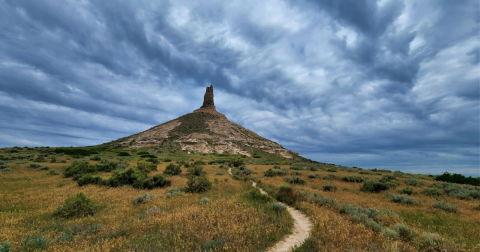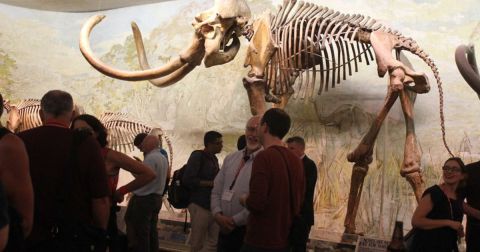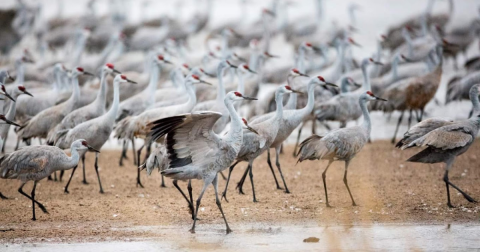15 Incredible Natural Wonders In Nebraska That Defy Explanation
Nebraska might not be the first place that comes to mind for incredible natural wonders, but trust me, it’s hiding some epic surprises. Imagine visiting the Agate Fossil Beds, which exude ancient charm, or traversing the rolling landscapes of the Sandhills and the captivating Fontenelle Forest. Nebraska’s got a whole lineup of jaw-dropping spots that defy explanation. So, gear up to explore the uncharted natural wonders in Nebraska, and be ready to witness nature like never before!
Best Gorges & Canyons In Nebraska
Explore Nebraska’s remarkable gorges and canyons, featuring Wauneta’s Little Grand Canyon and Chadron State Park’s canyons, as we uncover the beauty of these natural attractions sculpted by time and nature’s forces.
1. Wauneta's Little Grand Canyon
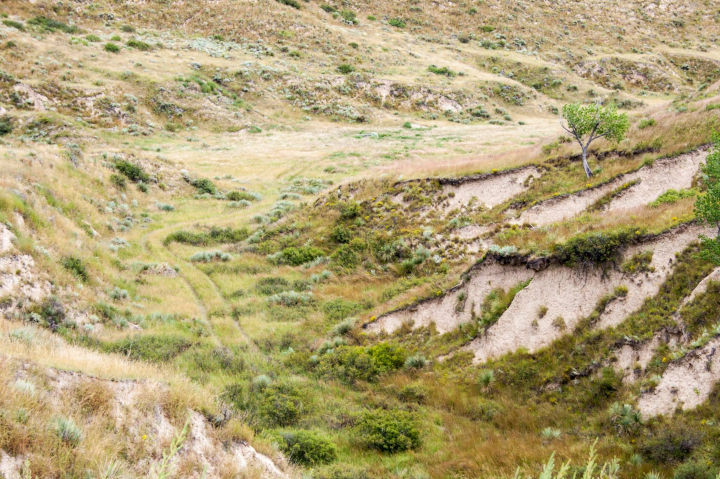
Nestled just outside the village of Wauneta in southwestern Nebraska, the Frenchman Creek valley, fondly referred to as Nebraska's Little Grand Canyon, is a surprising natural beauty. Along the scenic Route 6, locals know as Old Highway 6, a lookout spot that offers a breathtaking view of Wauneta's hidden treasure, a picturesque rolling landscape. Closed from the early 1970s until 1996, the overlook was revived by a local Eagle Scout and has since become a favored stop for travelers in the region.
While not as vast as Arizona's Grand Canyon, Nebraska's version boasts its own spectacular charm, making it a must-see destination for those exploring the Wauneta area.
2. Chadron State Park's Canyons
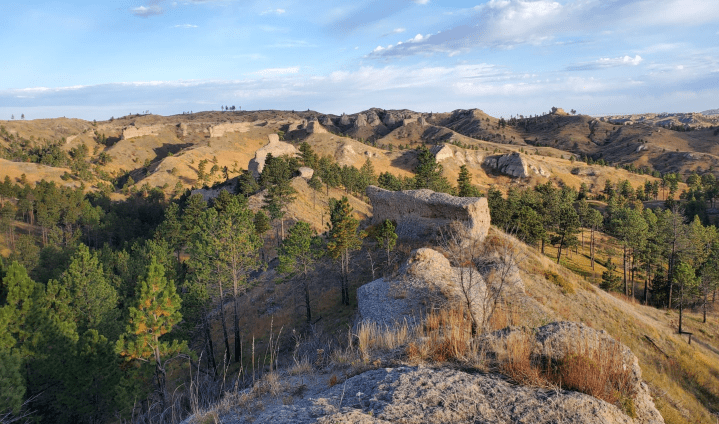
Nebraska boasts some impressive canyons, particularly in Pine Ridge's rocky landscape. Chadron State Park, situated in Dawes County, features two breathtaking canyons for hiking. The challenging four-mile Black Hills Overlook Trail offers stunning views of the North Canyon - while the shorter 1.4-mile Steamboat Loop Trail provides a memorable panorama from the top of Steamboat Butte. Additionally, the 1.5-mile Norwesca Trail takes you through the South Canyon, a more wooded section known as Lebo Canyon.
As you explore these trails, expect surprises like rock windows, hidden caves, and beautiful wildlife, showcasing the unexpected beauty of Nebraska's oldest state park.
Best Caves In Nebraska
Embark on an adventure through the Midwest as I unveil Nebraska’s best caves. From the mysterious depths of Indian Cave to the historical draw of Robber’s Cave, join me in discovering the underground wonders that add to the charm of the Cornhusker State.
3. Indian Cave
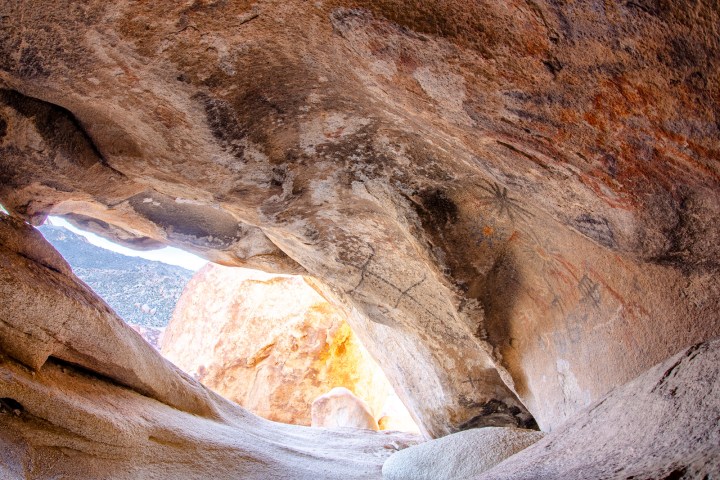
If you're ever in the area, you should check out Indian Cave State Park. The main attraction is the Indian Cave itself, which has some fantastic prehistoric Native American petroglyphs. No one knows exactly how old the petroglyphs are or where they came from, but they're worth seeing. You can check them out from the ADA-accessible boardwalk, which has seating, info signs, and a viewing deck right below the cave opening. Plus, the boardwalk offers a sweet view of the Missouri River.
4. Robbers Cave

Robber's Cave is a network of caves located beneath downtown Lincoln, Nebraska. It was once the city's first brewery and had been a notorious hangout spot for 130 years before being sealed off from the public.
Recently reopened for tours, visitors can now descend several stories to tour its depths and witness every inch of the Dakota sandstone walls covered with names, initials, dates, band names, symbols, and Greek letters. The history of Robber's Cave is filled with fascinating stories behind its origin and use through the years.
Best Waterfalls In Nebraska
Discover the magnificence of Nebraska’s waterfalls, from the serene Stone Creek Falls to the grandeur of Smith Falls and Snake River Falls. Uncover the natural beauty that defines the heart of America.
5. Stone Creek Falls
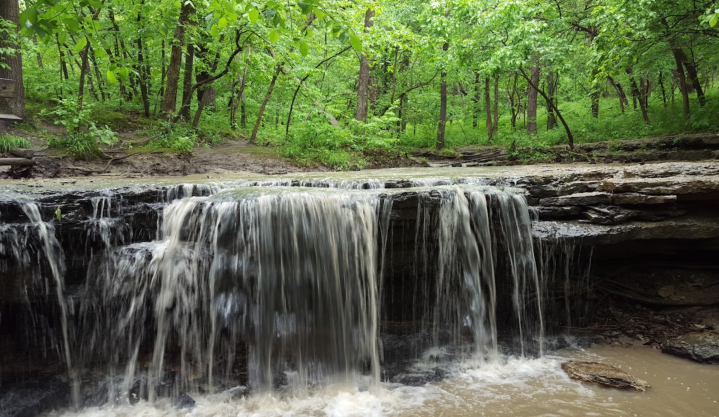
A mere half-hour from Omaha, Platte River State Park hosts Stone Creek Falls. Kick off your adventure from the park's lower parking lot, follow a simple wooded trail, and discover the tranquil little waterfall. Explore the creek above and below the falls, and feel free to wade around in the charming pool area.
6. Smith Falls
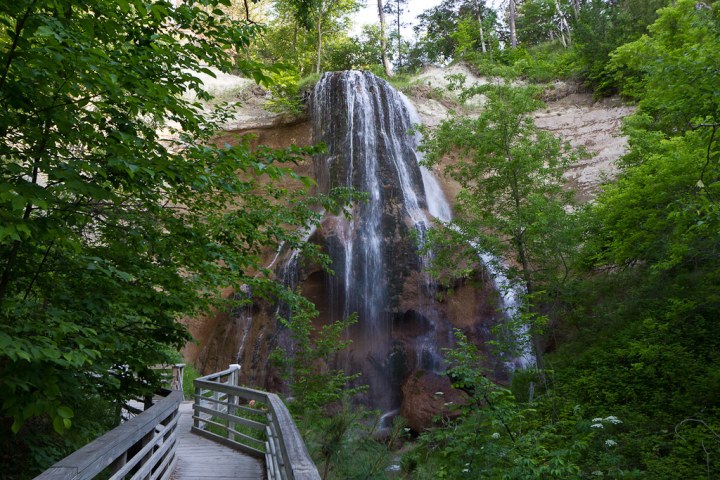
Standing at an impressive 70 feet, Smith Falls, Nebraska's tallest waterfall, is a must-capture moment. Nestled in the state's newest park, Smith Falls State Park, you can reach this stunning sight by crossing a footbridge from the park's north side or by leisurely floating down the river with tubes, kayaks, or canoes.
7. Snake River Falls
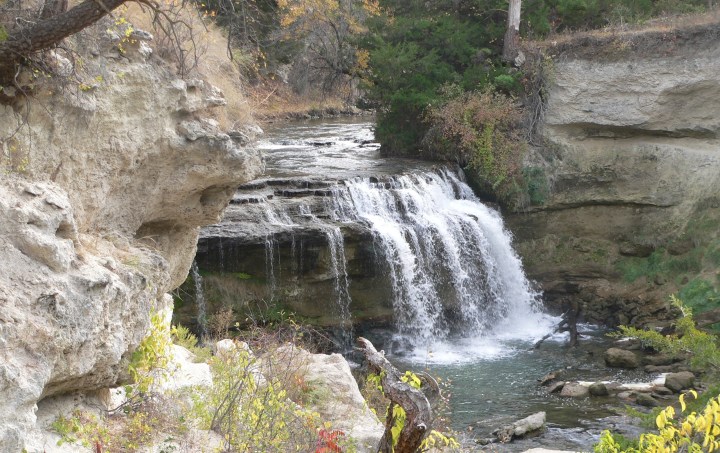
Snake River Falls is a stunning natural wonder located in the Nebraska Sand Hills. It's considered one of the most beautiful spots in the area, and for good reason. The water cascades into the canyon and flows freely to the Niobrara River, creating a breathtaking sight. You can access the falls from the Snake Falls Sportsmen's Club on Hwy 97 near Valentine. There are two pathways to view the falls, one of which is a short-minute walk to see the top of the falls, while the other is about a four-minute walk to view it from the front.
Best Overlooks & Scenic Vistas In Nebraska
Explore the best nature spots in Nebraska that offer breathtaking views. From the historic Windlass Hill to the captivating Blackbird Scenic Overlook, these locations showcase the best of Nebraska’s landscapes, perfect for nature enthusiasts and anyone seeking a scenic escape.
8. Windlass Hill

A little bit of info about this spectacular view - situated along the Oregon-California Trail, Windlass Hill serves as a landmark denoting the transition from the elevated table lands to the south into the Ash Hollow area and the North Platte River valley. Evident wagon ruts on the hill provide a tangible link to the historical passage of emigrants. Interestingly, the emigrants did not use the name "Windlass Hill," and the origin of the term remains untold.
9. Blackbird Scenic Overlook

Located just off Highway 75, the Blackbird Scenic Overlook near Macy, Nebraska, provides stunning views of the state. This spot is part of the scenic drive along the Missouri River, rich in history with ties to the Oregon Trail and the Lewis and Clark expedition.
Accessible with a short walk, the overlook offers expansive vistas stretching to Iowa. Maintained with the help of the Omaha tribe, the site features a shelter sharing information about the land and its Native American connections.
From the overlook, you can admire the rolling Loess Hills and the magnificent Missouri River, making it an ideal spot for breathtaking sunsets and sunrises.
Best Rock Formations in Nebraska
Check out Nebraska’s captivating natural wonders, where the rugged beauty of rock formations takes center stage. From the iconic Scotts Bluff National Monument to the otherworldly landscapes of Toadstool Geologic Park and the towering prominence of Chimney Rock, you can’t miss this must-see nature in Nebraska.
10. Scotts Bluff National Monument
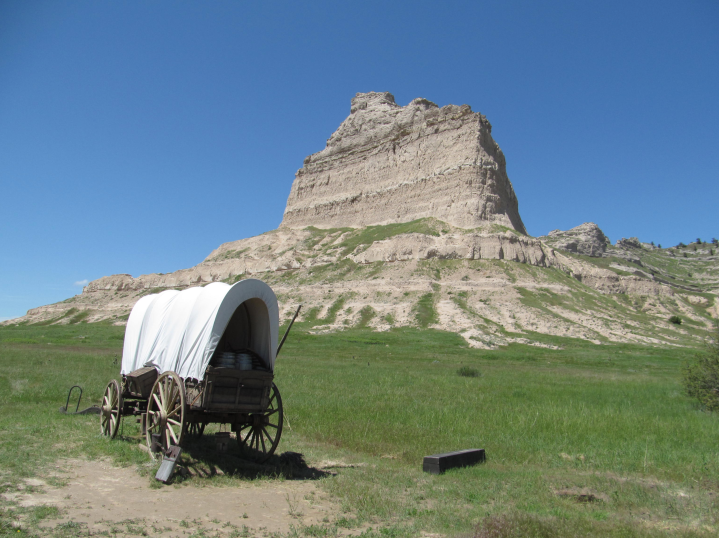
Scotts Bluff National Monument is a protected area in western Nebraska that covers over 3,000 acres of land. It features historic trails, mixed-grass prairie, rugged badlands, towering bluffs, and riparian areas along the North Platte River. The monument's north bluff is named after Hiram Scott, a clerk for the Rocky Mountain Fur Company, who passed away nearby in 1828.
It was an important landmark on the Oregon Trail, California Trail, Pony Express Trail, and the Mormon Trail, with over 250,000 westward emigrants passing through between 1843 and 1869. Despite its name, the monument comprises two separate bluffs, namely South Bluff and Scotts Bluff, with five major outcroppings.
11. Toadstool Geologic Park

Toadstool Geologic Park, located in the Oglala National Grassland in far northwestern Nebraska and operated by the United States Forest Service, boasts a distinctive badlands landscape with rock formations resembling toadstools. Often referred to as the "badlands of Nebraska" or the "desert of the Pine Ridge," the park features a one-mile loop trail showcasing fossils of prehistoric animals.
12. Chimney Rock
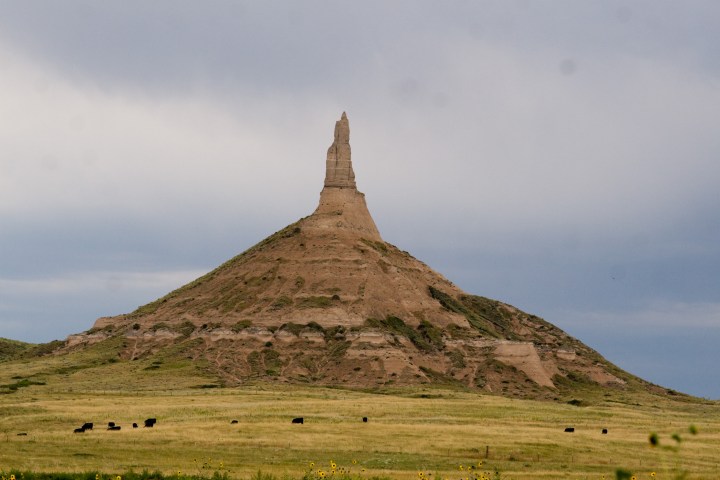
Chimney Rock, a prominent geological formation, stands nearly 300 feet tall, towering over the North Platte River valley at an elevation of 4,228 feet. It played a crucial role as a landmark along the Oregon Trail, California Trail, and Mormon Trail in the mid-19th century, guiding travelers along the north side.
Today, it remains a visible point of reference for modern travelers on U.S. Route 26 and Nebraska Highway 92.
Unique Natural Wonders in Nebraska
Get ready to explore some of Nebraska’s unique natural wonders! Agate Fossil Beds National Monument takes you back in time with ancient fossils, while the Sandhills offer a unique landscape filled with surprises. Fontenelle Forest, with its lush acres, brings nature to life. These spots in Nebraska are a nature lover’s dream, each offering its own adventure and a chance to connect with the great outdoors.
13. Agate Fossil Beds National Monument
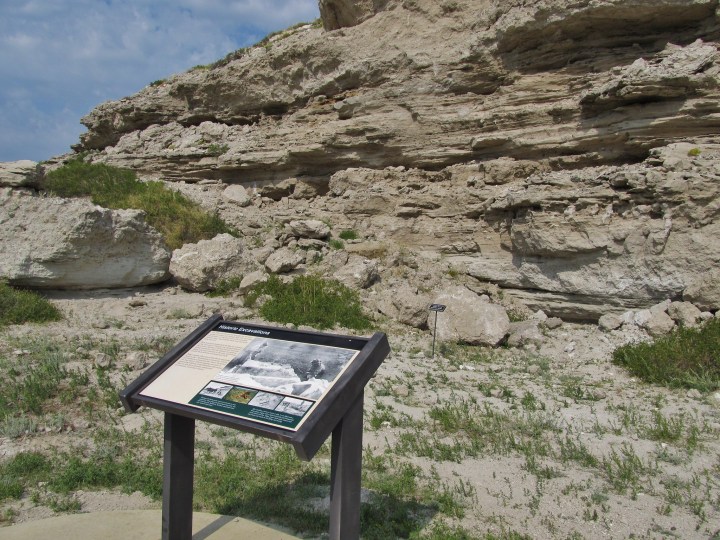
Situated in the northwest corner of Nebraska, Agate Fossil Beds National Monument boasts Miocene-age rocks with an impressive fossil record set in a unique unglaciated area of the High Plains. The landscape holds clues to the Miocene Epoch's grass savanna, once home to creatures like Dinohyus, Stenomylus, and Menoceras, whose traces remain in Agate.
The park, founded within the current natural ecosystem, preserves these fossil deposits and their geological context.
14. Sandhills

The Sandhills, a unique region in north-central Nebraska, cover a quarter of the state with grass-stabilized sand dunes, designated as a National Natural Landmark. These dunes, reaching heights over 330 feet, sit above the Ogallala Aquifer, creating lakes and fostering diverse wildlife, including 314 vertebrate species and 720 plant species. With minimal crop production, effective land management, and a thriving cattle ranching industry, the Sandhills maintain their ecological integrity and serve as a crucial habitat for migratory birds.
15. Fontenelle Forest

Fontenelle Forest is a massive nature center with 17 miles of trails and over 1,500 acres to explore. The one-mile boardwalk is perfect for wildlife watching and gives gorgeous views of the Missouri River. It's a top spot for birding and has rare wildflowers.
The Nature Center is loaded with exhibits, a kid-friendly play area, and a gift shop. Don't miss the Raptor Woodland Refuge, where you can check out fascinating birds of prey. Plus, it's a National Landmark and a Historic Place.
To sum up – the incredible natural wonders in Nebraska! Have you been to any of these nature places in Nebraska? Which are your favorite? Let us know! Are you looking for more natural attractions in Nebraska to check out? Don’t miss the Ashfall Fossil Beds State Historical Park.
Are you looking for a location to stay while exploring the state? Be sure to check out these vacation rentals!
OnlyInYourState may earn compensation through affiliate links in this article. As an Amazon Associate, we earn from qualifying purchases.


